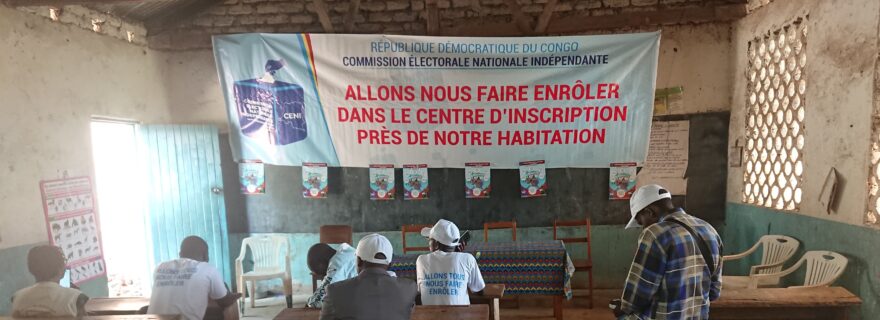Why care about electoral registration, if you’re not going to vote anyway?
Politicians worldwide are struggling to mobilise voter support. Despite the limited interest in the actual elections, Congolese citizens are queuing massively to register for elections. What explains this?
Across the world, politicians are making great efforts to mobilise their constituency to turn up during elections and cast their votes. Electoral turnout is important for democracies (although a close to 100% turnout is often more an indication of authoritarianism). In some countries, all citizens receive electoral cards, based on the population register. So, they do not need to take any steps themselves. But in countries without an updated population register, voting is a two-step procedure. In the first term, people get the opportunity to register for elections; the actual elections take place in the second term. Because the initial registration is used to determine the number of representatives per region, regional politicians strongly encourage people within their constituency to register themselves for the elections. This is what happened in the DRC between 24 December 2022 and 24 April 2023 in preparation for nation-wide elections, provisionally scheduled for December 2023. On 12 May, the Electoral Commission published the results of the registration, showing that close to 48 million people had indeed registered. During the audit, concluded on 22 May, invalid registrations were removed. In the end, close to 44 million voters remained, excluding three areas in the country in which registration did not take place due to the unstable security situation.
High interest in registering to vote, low interest in actual voting
In February 2023, the reputed Congo Research Group and its Congolese partner organisation Ebuteli published the results of a poll conducted among 3632 Congolese, spread over all of the country’s 26 provinces. The poll indicated that almost 54% of the people are not planning to cast their votes in the upcoming elections.
Yet, despite the low interest in the elections and the pessimistic expectation of people about the state, people were queuing massively to register for the elections – so much so that the electoral registration period had to be prolonged several times to enable everybody to register. During the registration period, our team conducted fieldwork as part of the Just Future Alliance. The results showed that many people in the city of Bukavu (in the conflict-affected east of DRC) had to wait for several days to register, some even trying their luck – often in vain – at different registration offices. Some respondents complained about having to make informal payments to be able to register. Others travelled from the city to their communities of origin to avoid the long queues.
Why bother to register?
Why do Congolese citizens care so much about registering for elections that they are not even interested in? The answer is simple and related to the additional importance of the voter card. Many Congolese citizens do not have an official identity document. This applies not only to the elderly, but also to the younger generation. In our research, we found that many parents have never registered the birth of their children. In the absence of an official identity card, the voter card is widely accepted – and needed – in daily life as proof of one’s identity. Some of our respondents have been living in the city for several years, but nevertheless register themselves in their communities of origin. Having this community mentioned as the place of residence on their voter card, makes it easier for them to negotiate their passage with their voter card at one of the many formal or informal road blocks leading to their communities of origin, and hence to maintain a connection with relatives and resources left behind. Cross-border traders in the border city of Bukavu easily travel to neighbouring Rwanda if they have registered themselves in the city. Moreover, in this region, issues about identity and belonging are at the root of some of the long-term conflicts. Therefore, being able to prove Congolese citizenship (and refute Rwandan citizenship) can even be a matter of life and death. In this regard, people from particular ethnic groups in the east of the country are sometimes threatened not to register, as they are not seen as real Congolese citizens by members of other ethnic groups.
How to register without a legal identity?
Identity cards have not been issued in the country for almost three decades (though equipment and registers that have been used by the Electoral Commission are supposed to be made available in the near future for census taking and the issuance of identity cards). Passports are costly and only used by the privileged who travel internationally. Thus, most people resort to their old voter card to prove their identity. Unfortunately, this is not an option for people who have lost their card, or for younger people who were not eligible to vote during the previous elections. Luckily, there is a solution for this. According to the electoral law, in such cases people need to come to the registration office in the presence of three witnesses, one of which is a member of the local authorities. In practice, it often suffices to bring a written statement from one of the local authorities.
Electoral promises
In past years, citizens have commonly referred to the DRC as ‘the said Democratic Republic of Congo’ (‘La république dite democratique du Congo’), questioning the authenticity of the democracy in their country. Disappointing and contested electoral outcomes have made them question the usefulness of casting their votes. Only time can tell to what extent politicians can convince their constituency to fulfil their civil duties. Casting a vote is an important step to sustain the realisation of democratic values. At least a large part of the population has met the precondition and registered for the election. It’s now the politicians’ turn!



0 Comments
Add a comment